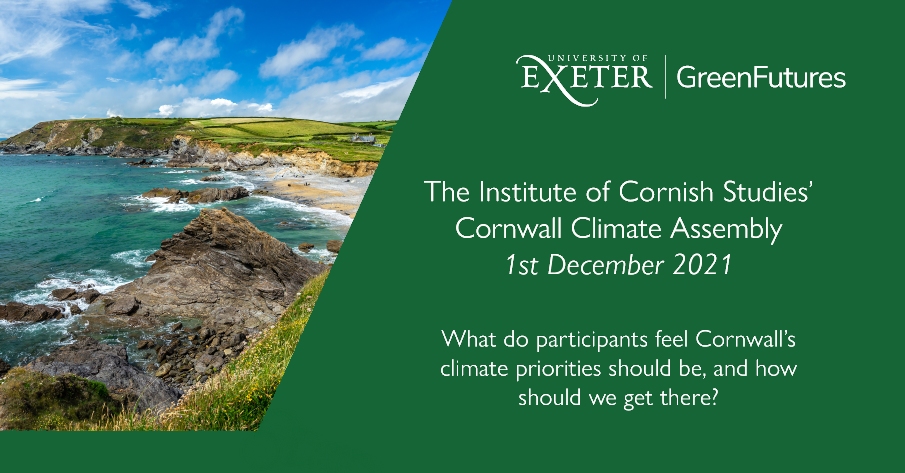Cornwall's Climate Assembly 2021: The Full Report
On 1st December 2021, the Institute of Cornish Studies - together with Green Futures - brought together leading academics, environment officials and Cornwall residents to discuss what we need to do in order to address climate change. Our format was a type of citizens assembly, which aimed to explore what people in Cornwall feel is important, and the policy solutions that need to be implemented at a local and national level.
Following presentations by our academic expert witnesses (including Prof Juliet Osborne on Pollinators, Prof Caitlin Desilvey on Heritage, Professor Clare Saunders on Sustainable Clothing, Dr Ian Ashton on Marine Renewables, and Dr Steffen Boehm on Circular Economy), citizens discussed how they view the challenges and solutions posed. Later, they presented their discussions to our policy-maker panel (including Luke Pollard MP; Lizzy Carlyle, Head of Environmental Practices for the National Trust; Emmie Kell, CEO Cornwall Museums Partnership; Fiona Wotton, CEO Creative Kernow; Cllr Martyn Alvey, Portfolio holder for the Environment, Cornwall Council. Our panel were then invited to reflect on what they had heard.
Participants argued that we need better processes to help us adapt, and communicate local needs to all levels of government. They also felt that we need to be better at sharing our ideas, whether these are about food waste, local food, the circular economy, or the impact of what we flush down the drain on our waterways. Museums and the creative sector can play a part in this process, but tourism also has a role to play, particularly in terms of sharing knowledge about our green solutions with Cornwall's many visitors.
In short, people in our communities have lots of positive ideas and motivation, but they need meaningful opportunities to be able to help in tackling climate change.
Some examples about the practical solutions we could pursue included: retrofitting homes to make them more efficient, buliding better biodiversity support into our buildings and gardens, improving our public transport infrastructure (particularly local bus and rail services). There were plenty of suggestions about the barriers and solutions for doing this.
Finally, our participants told us that what we need most is for people to feel much more connected with nature. While we already know that things like litter picks are really important for helping people to connect with their environment, but we need to know more about other initiatives that people can get involved with and build a greater affinity with the environment for generations to come.
Key findings
Four interlinked themes emerged during the event: processes, communication, practical solutions, and gateway connections to nature.
- We need to improve our transport and housing systems to help us to adapt to more environmentally friendly behaviours.
- We need to improve how we share information about solutions and issues is crucial, as are the sectors which can help us to do this more effectively (such as museums and the creative sector).
- We need more of certain 'gateway' activities which help connect people to their environment.

